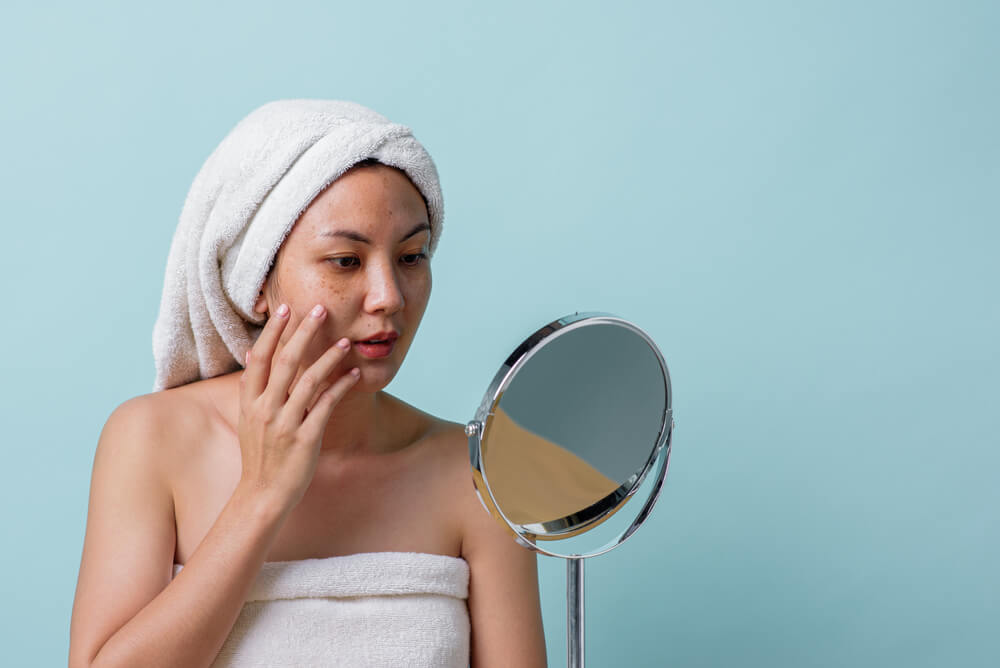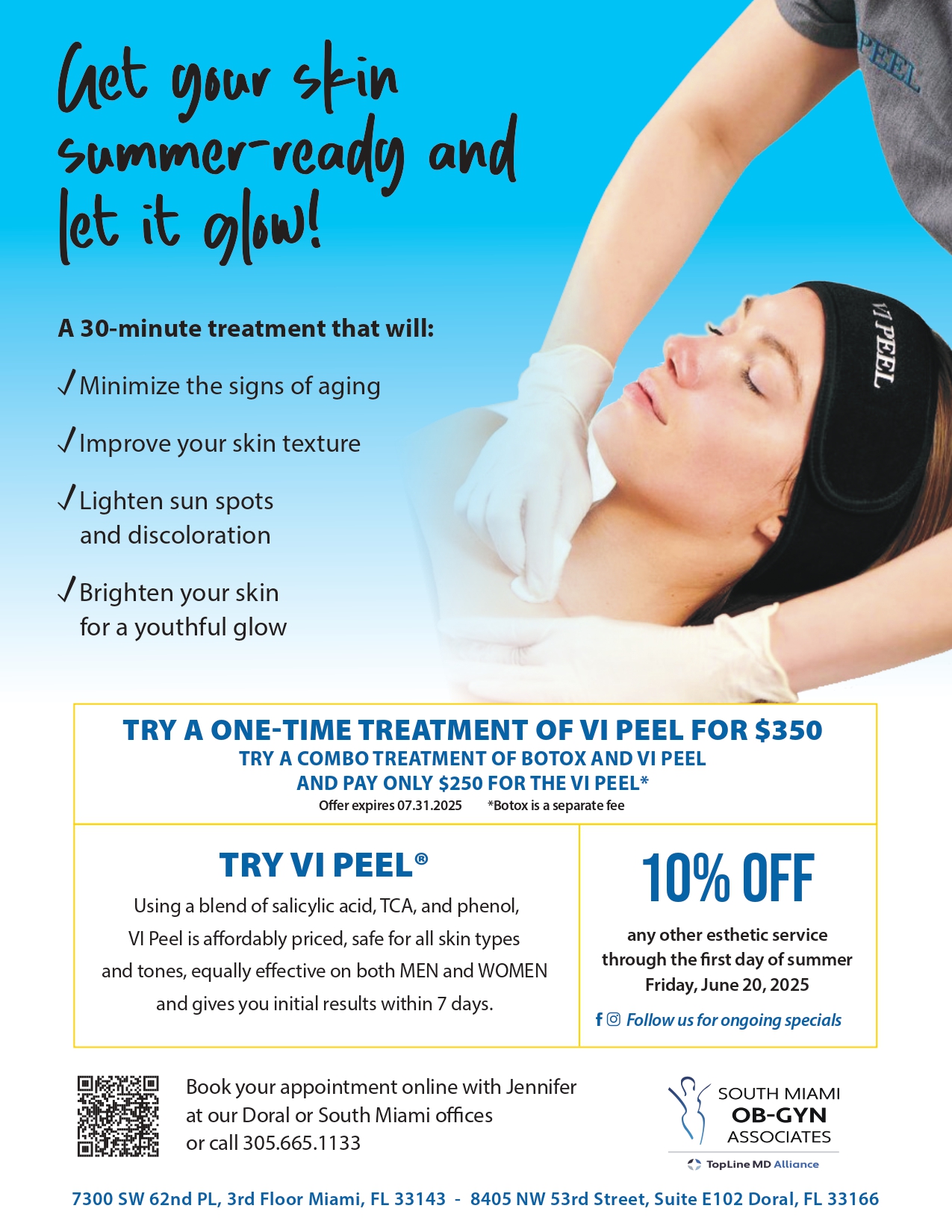Skin discoloration or hyperpigmentation is a relatively common condition where spots or patches darker than the natural skin tone appear. The severity of discoloration often varies from person to person. Some people may notice just a couple of tiny darker spots on their cheeks or forehead, while others may deal with larger and more apparent patches of discoloration.
Hyperpigmentation can be caused by many different factors such as age, hormonal levels, pregnancy, sun exposure, and even underlying health conditions. In general, skin discoloration on the face is not dangerous, but experiencing it can be frustrating. Fortunately, there are many ways to even out skin tone, from skincare products such as acid-based peels to cosmetic procedures such as Morpheus8 Skin Treatment. The Morpheus8 treatment is available at South Miami OB-GYN Associates in both the South Miami and Doral offices.
What Causes Skin Discoloration?
Melanocytes, which are skin cells located in the epidermis, produce melanin, the pigment that creates the skin’s natural color. Melanin also protects the skin from harmful UV rays. You’re your skin is exposed to direct sunlight and UV rays; the longer the exposure, the more melanin is produced, which is why you tan. Facial skin discoloration happens when certain areas on the face produce more melanin compared to others.
When small cell clusters produce more melanin, people develop so-called age spots. They appear as small darker spots on the skin. In a similar vein, melasma, which is a hyperpigmentation disorder that affects larger skin areas, happens when melanocytes in those larger areas produce higher amounts of melanin.
What are the Risk Factors for Skin Discoloration?
Skin discoloration can be considered relatively common, but certain factors may increase the risk of hyperpigmentation:
- Being female: Women are more affected by certain discoloration disorders such as melasma; almost 90% of people with melasma are female.
- Having a naturally darker skin tone: Since naturally darker skin has more melanocytes, people with darker skin tend to suffer from hyperpigmentation more often.
- Familial History: People whose relatives suffer from hyperpigmentation disorders such as melasma have a higher risk of developing it themselves.
- Increase exposure to sunlight: Individuals who spend a lot of their time in the direct sun produce more melanin which increases discoloration on the face and body.
How to Get Rid of Hyperpigmentation with Skin Care Products

Good skin care products can help reduce hyperpigmentation. Here are the ingredients to look for when choosing a skincare product to treat hyperpigmentation:
- Tretinoin is usually found as a prescription cream or gel. This particular skincare ingredient is known to promote new skin cell production. Because of its effect, it’s a helpful product to add to your skincare routine for hyperpigmentation and anti-aging.
- Hydroquinone is another skincare product that’s often available as a cream. Depending on the hydroquinone strength in the cream, you might need a prescription to get it. However, lower hydroquinone doses are typically available as over-the-counter creams. This product has skin-lightening properties, which is why it’s a prevalent solution for treating various discoloration issues, especially melasma.
- Acid-based peels such as salicylic and azelaic acids have become popular for lightening your skin by removing dead skin layers without aggressive scrubbing. There are different concentrations of acid available in various products. Excessive use of overly strong acids could damage the skin. On the other hand, milder versions can make a huge difference.
Skincare products can be effective but they do not work overnight. You may need to wait for three to six months to truly notice apparent changes. Cosmetic procedures generally provide faster results.
How to Get Rid of Discoloration with Cosmetic Procedures
Here are some cosmetic procedures to consider:
- Chemical peels use a more robust acidic solution to entirely remove damaged and dead skin cells. The acid in these particular peels is very strong so it is essential to trust a professional to do the peel. Once the surface layers of damaged and discolored skin are gone, new skin will grow in its place, but with no previous issues such as scars and dark spots.
- Microdermabrasion is another cosmetic procedure that removes the surface layers of damaged skin in a minimally invasive manner. A unique instrument is used to remove the skin so that new and healthy skin grows again. Like chemical peels, microdermabrasion can treat discoloration and other skin issues such as wrinkles, scars, etc.
- One of the most innovative methods of skin treatment today is the Morpheus8. This particular treatment effectively combines radiofrequency with microneedling to promote the skin’s natural collagen production. The tiny needle pins penetrate the skin releasing radiofrequency energy, which gently heats the skin, thus promoting collagen production, which, together with the heat, enables the skin to appear tighter and plumper.
Can Skin Discoloration be prevented?
While skin discoloration has a genetic and gender component, there are preventative measures you can take:
- Use proper sun protection, such as a high SPF of at least 30 that works for your skin type
- When you have to go out in the sun, wear a hat and sunglasses as well as cover the sensitive areas on your body that could be prone to discoloration
- If you suffer from acne and some other skin conditions that could potentially leave scars and dark spots, make sure to treat them properly.
- Resist the urge to pop pimples
- Don’t use abrasive skincare products. Your skin will benefit more from gentle skincare products made for sensitive skin
Skin discoloration is a relatively common issue but can affect your self-esteem. Fortunately, effective solutions including skin care products and cosmetic procedures are available to treat hyperpigmentation.
At South Miami OB-GYN Associates, we offer a free skincare consultation and a full range of skincare products and aesthetic procedures so you can look good and feel good. Book an appointment online today.




